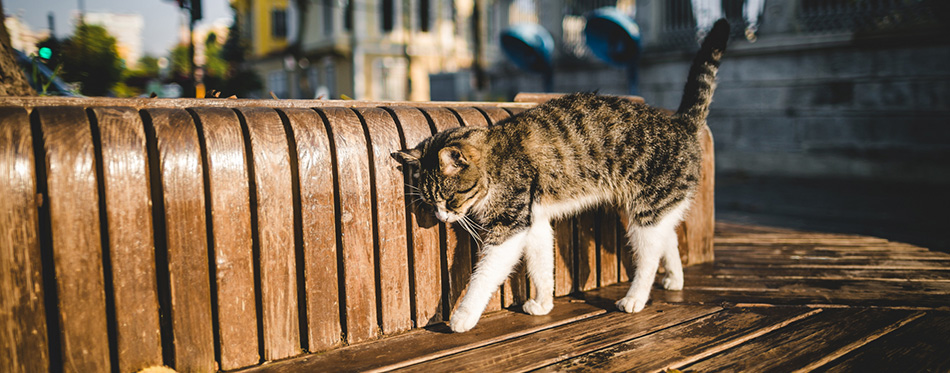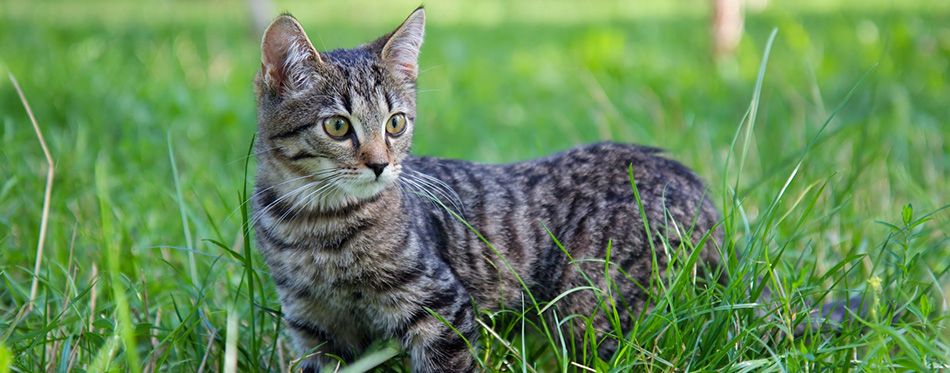Cats are curious creatures with some funny and downright strange behaviors which even cat experts struggle to explain. While some of these strange behaviors and symptoms can be harmless like making funny noises or scratching things for attention, others can be more severe, like losing weight without explanation. This behavior is often a red flag, indicating more serious problems are afoot, but most cats will experience this to some degree during their life. If you notice this behavior you should immediately inform your vet to have the best chance of understanding the cause before it becomes more serious, minimize risk and to give your kitty the best chance of recovery.
In this article we’re going to look at symptoms which often appear alongside weight loss, what to look out for and what these symptoms could mean. We’ll also cover how your vet might diagnose any medical conditions and what you can do to keep your cat safe and healthy. This should help you understand what your cat might go through at some point (although we certainly hope not!) and how to handle the situation to give your cat the best chance they have at recovering.

What to Look Out For
If you’ve noticed a sudden drop in your cat’s weight, you should first inform your vet to seek medical advice and you should also monitor their behavior and any other habitual changes they are exhibiting. Extreme weight loss (more than 10% of the cat’s normal bodyweight) can be accompanied by other symptoms as it is typically an indication of a more serious medical condition. Some other symptoms you should look out for include:
- General soreness shown through tenderness or weakened movements.
- Irregular urine production (more, less or a complete cessation).
- Irregular behaviors (such as heightened aggression or shyness).
- Lethargy or oversleeping.
As stated, you should contact the vet if you notice an excessive amount of weight loss in your cat. You should also inform the vet if you notice any of these symptoms (or any other irregular symptoms you may notice) as this will greatly improve the chances of finding a cause and reaching the correct diagnosis.
Reasons for Unexplained Weight Loss
When understanding why cats lose weight, it’s important to remember that weight loss can also be a normal result of a diet change or anxiety linked to a change in the environment. Although serious medical conditions might be involved, it is entirely possible for weight loss to be a result of dietary changes, stress or anxiety. If you or vet believe stress, anxiety or dietary changes are the cause, you might be able to help your cat recover through some simple lifestyle and dietary changes. We’ll go over this in the next section. For now, it’s important to look at the possible conditions which may cause unexplained weight loss in cats, and if possible, provide some ways of identifying these conditions.
Diabetes: This condition is fairly common in cats but the symptoms can vary slightly from feline to feline. It is caused by a lack of insulin production within the pancreas or the body’s inability to process and respond to insulin. Other symptoms which might accompany weight loss caused by diabetes include a loss of appetite, increased urination, increased water consumption and general lethargy.
Hyperthyroidism: This condition occurs when the thyroid gland becomes overactive and produces too much of the hormone thyroxine. If cats suffer from this condition, they may also have an increased appetite (including fluid intake), increased urination production, hyperactivity, diarrhea, and vomiting. After noticing any of these symptoms, the cat should be taken to the vet immediately for diagnosis and to receive the correct medical attention required for recovery. If left untreated or undiagnosed, this condition can lead to organ failure, heart problems or even death.
Anorexia: Anorexia affects cats similarly to the way it affects humans. Anxiety, stress and trauma can result in a partial or complete loss of appetite, resulting in excessive weight loss. These are arguably the most common causes of anorexia in cats but that doesn’t necessarily make them easy to treat. If you’re worried your cat might be experiencing anorexia caused by stress, anxiety or trauma, check their food bowl to if they’re eating properly and look for other symptoms like lethargy, lack of activity and overtiredness.
Parasitic infections (commonly known as ‘Worms’): Intestinal worms can affect cats just like they affect humans too. If your poor kitty has a parasitic infection you will typically notice a loss in bodyweight despite them eating regular amounts of food. Other symptoms of parasitic infections include lethargy, a swollen tummy, sensitivity, or you might even notice whole or partial worms in the cat’s waste. Most cats receive regular worm and flea prevention from their vet which means they shouldn’t contract worms, but if a cat doesn’t receive this treatment, it should be worth seriously considering. You may also like our article on dewormers for cats.
These are just a few reasons which explain excessive weight loss in cats but it isn’t a full, comprehensive list. Weight loss can be caused by a number of other medical conditions and can appear amongst other symptoms or entirely on its own. Noticing these symptoms early is the best way to ensure your cat’s safety and to give them the best chance of successful recovery following diagnosis.
Diagnosis and Recovery
You might be wondering how a vet determines the cause of a cat’s seemingly unexplainable weight loss but there a few ways of doing so. We’re going to take a look at the main ways a vet will test and diagnose these conditions, the typical recovery process and what you can do to help your cat during this time. Vets will typically start with a few non-intrusive tests to understand what the cause of your cat’s weight loss might be. Following these initial tests and a general checkup, the vet may have to carry out one or more of the following tests to identify the specific condition or to estimate how far the condition has deteriorated. The tests could include:
- An ultrasound of the cat’s abdomen.
- Urinalysis (to check hydration levels and kidney function).
- Stool Analysis (to check for intestinal parasites).
- Blood Tests (to check for blood disorders or infections).
- X-rays (to observe vital organs).
- Surgery (usually as a last resort if the diagnosis cannot be confirmed by other tests).
If your cat’s weight loss is a symptom of a medical condition, your vet should be able to diagnose this through one or more of these tests. Following the diagnosis, the vet will recommend an appropriate treatment which might include medication in the form of pills, injections, intravenous therapy or possibly surgery depending on the severity of the condition. Each condition will have a specific treatment and your vet will provide the information and supplies you need to help your feline friend fully recover.
If your cat’s weight loss is linked to stress, anxiety or trauma, your vet might recommend some suitable treatments in the form of lifestyle changes. This might involve changing your cat’s food to an alternative that they prefer, moving/removing objects where they sleep or eat which could be triggering this stress, or maybe some extra time for you two to play and spend time together. Stress and anxiety can be quite common in cats but the treatment is specific to each cat. It might take some time for your cat’s appetite to return but by following the advice of your vet, trying different solutions and with patience, your cat should make a good recovery.
Whether the condition is physical or mental, your cat will need special care when recovering. Your vet will recommend they follow a healthy and balanced diet to increase their weight which will help to boost the quality and speed of their recovery. Some cats might also need force-fed, provided with nutrition supplements or, in severe circumstances, they might need to be fed intravenously to assist in their recovery process. Cats will need follow-up appointments with the vet to assess their recovery and how effective the current course of treatment is going. During these check-ups, the cat’s weight will be monitored in case of fluctuation and the vet will either recommend the same treatment or an altered treatment depending on the cat’s response. This recovery might take some time, but with the right treatment and a patient, supportive owner, a cat will have the best possible chance of recovery.

Final Thoughts
Unexplainable weight loss in cats can be an understandably scary thing for a cat parent but it can be fairly common amongst some cats. We hope that after reading this article you’ve learned a few things about why cats can lose weight, symptoms to watch out for and what the diagnosis and recovery process might look like. While we certainly hope you never have to go through this, you’ll know what to look out for and how to be best prepared. Like any medical problem your cat might face, the important thing to remember is to consult a vet as early as possible after noticing and changes or new symptoms. This will give your cat the best possible chance for a successful recovery.
Sources:
- CAUSES OF WEIGHT LOSS IN OLDER CATS – VetMed Illinois
- Feline Weight-Loss Study – VetMed Virginia Maryland

